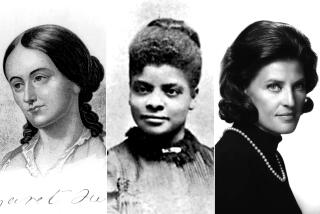Political Analyst Joseph Kraft Dies at 61
- Share via
WASHINGTON — Joseph Kraft, whose nationally syndicated column during the past quarter century earned him a reputation as one of America’s foremost analysts of national and international affairs, died Friday night in Washington Hospital Center. He was 61.
Kraft, who had a history of heart problems, entered the hospital a few days after Christmas after suffering from flu-like symptoms. He had been treated in the coronary care unit. Elizabeth Pozen, an assistant to Kraft, said that he died of heart failure.
Friends said that his wife of 26 years, Polly, a successful painter, was with him when he died at about 7:10 p.m.
A wide-ranging journalist who was a friend--and sometimes a tart critic--of presidents and kings, Kraft was an articulate and prodigious writer who coined the term “middle America” in the 1960s.
He was a Los Angeles Times columnist whose twice-weekly writings were syndicated to more than 200 newspapers. He was the author of four books, wrote speeches for John F. Kennedy and regularly contributed prize-winning articles to The New Yorker.
Compared With Lippmann
“He was the closest to a modern Walter Lippmann of all our columnists,” said Lloyd Cutler, a prominent Washington attorney and counsel to President Jimmy Carter. “Except he was much more objective than Walter Lippmann.”
Lippmann himself once called Kraft “the most promising commentator of his generation.” And after Lippmann died in 1974, Encounter magazine described Kraft as “the only visible replacement for Walter Lippmann.” Harper’s magazine called him “one of the best thinkers of his writing generation” and Time magazine described his column as “must reading in Washington.”
Syndicated columnist Rowland Evans said Kraft’s column “really was his life. He didn’t play tennis. His life was his work. If he ever missed a column, it was only one or two. He worked right through any illness.”
Colleagues recalled that Kraft suffered his first heart attack in the mid-1960s and had another one a decade later. But, as Tom Johnson, publisher of The Times, noted, “He was never content to sit behind a desk. He was always out there working.”
Recruited for The Times
Johnson, who as a young White House aide met Kraft in the mid-1960s, recruited him for the Los Angeles Times Syndicate in 1980, luring him away from the Field Newspaper Syndicate, which had distributed his column for 15 years.
“Joe Kraft was a splendid journalist,” Johnson said. “He brought great distinction to his profession and to this newspaper. He was a friend, and we will miss him greatly.”
Katharine Graham, chairman of the board of the Washington Post Co., said Kraft was “a brilliant and sensitive journalist with an extraordinary range of sources in this country and all over the world. He was also a close friend.”
The Post’s executive editor, Benjamin C. Bradlee Jr., said of his long-time friend: “He was one of a vanishing breed of educated, completely thoughtful, decent, committed men.”
Kraft, born in New Jersey, was educated at Columbia University, where he was elected to Phi Beta Kappa, and at Princeton University and the Sorbonne. He was the youngest member of the Institute for Advanced Study at Princeton at a time when fellow members included J. Robert Oppenheimer, Arnold Toynbee and T. S. Eliot.
Began as Sports Writer
His first job as a journalist was at age 14, as a sports reporter for the New York World Telegram. He later became an editorial writer for the Washington Post and a correspondent for the New York Times and Harper’s. He won the Overseas Press Club Award for distinguished reporting from abroad in 1958, and again in 1973 and in 1980. His four books are “The Struggle for Algeria” (1961), “The Grand Design” (1962), “Profiles in Power” (1966) and “The Chinese Difference” (1973).
It was during the Vietnam War years that Kraft established himself as one of the nation’s leading columnists.
He was one of the first columnists to oppose the war vigorously, and chronicled its destructive impact on Indochina and its divisive effects on American society. This left him tagged as a “liberal,” but later in his career he became, as Newsweek called him, “middle of the road in his views . . . someone who does not predictably occupy an assigned frequency.”
New York Times columnist James Reston said, “The main thing about Joe Kraft, in my mind, is that he tried to deal with the causes of human suffering, rather than the results.
“With the possible exception of (I. F.) Izzy Stone, no journalist of his time in Washington studied the official documents more carefully, questioned officials more precisely or worked so hard, knowing he had so little time, to fight for the facts and against the television pretenses of contemporary politicians,” Reston said.
In addition to his wife, Kraft is survived by two stepsons, Mark and David Stevens, and a brother, Gilman Kraft. Funeral arrangements were incomplete.
More to Read
Sign up for Essential California
The most important California stories and recommendations in your inbox every morning.
You may occasionally receive promotional content from the Los Angeles Times.













